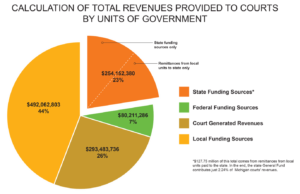Legislative Update 5-8-20
Stay at Home order extended to May 28; work restrictions eased
 Michigan’s Stay at Home order has been extended to May 28, Gov. Gretchen Whitmer announced in a press conference Thursday afternoon. The new order, EO 77, however has enhanced exceptions to allow for a variety of work activities, ranging from auto production to garden centers. E0 77 also notes that “Businesses, operations, and government agencies that remain open for in-person work must, at a minimum:
Michigan’s Stay at Home order has been extended to May 28, Gov. Gretchen Whitmer announced in a press conference Thursday afternoon. The new order, EO 77, however has enhanced exceptions to allow for a variety of work activities, ranging from auto production to garden centers. E0 77 also notes that “Businesses, operations, and government agencies that remain open for in-person work must, at a minimum:
- “(a) Develop a COVID-19 preparedness and response plan, consistent with recommendations in Guidance on Preparing Workplaces for COVID-19, developed by the Occupational Health and Safety Administration and available here. Such plan must be available at company headquarters or the worksite.
- “(b) Restrict the number of workers present on premises to no more than is strictly necessary to perform the in-person work permitted under this order. …”
During her Thursday presentation, Whitmer outlined the phases Michigan is going through to address the COVID-19 pandemic.
The governor also released her Safe Start Plan to guide businesses in the days and weeks ahead. Businesses in the construction, real estate and manufacturing fields have been cleared to resume operations before the end of May.
House, Senate file lawsuit challenging governor’s emergency powers
 House Speaker Lee Chatfield (R-Emmet) and Senate Majority Leader Mike Shirkey (R-Jackson) filed a lawsuit in the Michigan Court of Claims this week seeking a declaratory judgment that the governor has violated the Michigan Constitution by taking away legislative authority via the continued declarations of emergency and her subsequent executive orders.
House Speaker Lee Chatfield (R-Emmet) and Senate Majority Leader Mike Shirkey (R-Jackson) filed a lawsuit in the Michigan Court of Claims this week seeking a declaratory judgment that the governor has violated the Michigan Constitution by taking away legislative authority via the continued declarations of emergency and her subsequent executive orders.
The controversy surrounds which law applies to the governor’s ability to act unilaterally during this pandemic. The governor has declared a state of emergency under a law established in 1945, which allows the use of emergency powers until such time as the governor deems the emergency is over. The other law the governor has used is a 1976 measure that allows her to declare a state of emergency for 28 days, after which the Legislature much approve any extensions of the declaration.
The Legislature did approve an SOE extension to April 30 but has not acted to extend one beyond that date. All executive orders, including the Stay Home orders, are contingent upon the continuation of the state of emergency. A May 15 hearing has been set on the lawsuit.
For more information on this issue, contact Deena Bosworth at bosworth@micounties.org
EO 75 extends virtual meetings under OMA
 County boards may continue to hold remote sessions until June 30 under Executive Order 75, which Gov. Gretchen Whitmer signed Wednesday night.
County boards may continue to hold remote sessions until June 30 under Executive Order 75, which Gov. Gretchen Whitmer signed Wednesday night.
EO 75 continues the remote option that ordinarily would not be allowed by the state’s Open Meetings Act. The purpose of the order is to allow local entities to hold necessary public meetings without endangering the public health now threatened by COVID-19.
For additional background on legal and mechanical issues relating to remote board sessions, see these links, which also can be found on MAC’s Resources Page:
- Memo on OMA and public attendance under EO (3/31)
- MSUE webinar on emergency changes to OMA (3/28)Update on Executive Order 2020-15 on OMA (Firm of Cohl, Stoker and Toskey, 3/20)
Rep. Lightner urges immediate action on trial court funding
House Bill 5488  would extend authority for Michigan’s trial courts to levy fees, thereby keeping court funding stable until long-term reforms can be enacted, the bill’s sponsor told the House Judiciary committee this week.
would extend authority for Michigan’s trial courts to levy fees, thereby keeping court funding stable until long-term reforms can be enacted, the bill’s sponsor told the House Judiciary committee this week.
Addressing the committee, chaired by Rep. Graham Filler (R-Clinton), Rep. Sarah Lightner (R-Jackson) noted that current authority to levy fees expires in October and a lapse would devastate court operations.
The Legislature restarted the committee process this week with protocols in place to reduce risk of spreading COVID-19. Some members wore masks, seating in the committee rooms was reduced and committees allowed testimony through Zoom.
The state’s Trial Court Funding Commission said court costs “directly account for as high as $291 million annually in support (most of the 26.2 percent generated). Additionally, approximately $127 million of the annual funds transferred from the State originate from court assessments at sentencing. When totaled, Michigan trial courts are supported, in significant part, by over $418 million assessed to criminal defendants.”
MAC encourages swift passage of HB 5488, but recognizes it is not the final solution to court funding. MAC supports further legislative action to implement reforms recommended through the Trial Court Funding Commission once this bill is passed. The recommendations of the commission address Michigan’s historic problem of financial influence on the justice system and will create a more efficient system and stable source of funding for our courts.
Please contact your legislators to support HB 5488 and ensure final passage as soon as possible.
For more information on this issue, contact Meghann Keit at keit@micounties.org.
State court office gives guidance on operational restarts
 The Michigan Supreme Court has issued Administrative Order 2020-16, which requires courts to follow a careful, phased approach in returning to full capacity. Per the Supreme Court General Counsel, “Court plans must be based on the advice of local health experts and be approved by the State Court Administrative Office (SCAO) prior to implementation.”
The Michigan Supreme Court has issued Administrative Order 2020-16, which requires courts to follow a careful, phased approach in returning to full capacity. Per the Supreme Court General Counsel, “Court plans must be based on the advice of local health experts and be approved by the State Court Administrative Office (SCAO) prior to implementation.”
Additionally, the “order also stipulates, “Courts must maintain their current level of operations until SCAO approves a court’s plan to expand in-court proceedings. Courts in each circuit may work together to submit to SCAO at each gating level a single plan wherever possible consistent with the SCAO guidelines for returning to full capacity. Conditions may also require a court to move to a previous access level, depending on local conditions.”
The full order and detailed guidance for courts can be accessed here:
MAC advises connecting with your SCAO regional office for questions regarding phasing back to “full capacity,” or about any judicial administrative orders.
Michigan aiming for big testing boost, governor tells local officials
 Michigan is working toward testing 1 percent to 2 percent of its total population each week, Gov. Gretchen Whitmer told a virtual audience of local government leaders on Tuesday evening.
Michigan is working toward testing 1 percent to 2 percent of its total population each week, Gov. Gretchen Whitmer told a virtual audience of local government leaders on Tuesday evening.
Such testing would, at the high end, represent about 200,000 tests conducted per week. At present, Michigan is testing at a rate of about 60,000 per week.
Whitmer did note that supply chain issues on testing materials still exist, but that she expected the state to reach its testing goals in “next week or two.”
Sign up now for next Treasury webinar on May 18
 In partnership with the Michigan Association of Counties, Michigan Municipal League and Michigan Townships Association, the Michigan Department of Treasury is pleased to announce the third joint webinar, “COVID-19 Updates and Resources for Local Governments,” at 2 p.m. on Monday, May 18.
In partnership with the Michigan Association of Counties, Michigan Municipal League and Michigan Townships Association, the Michigan Department of Treasury is pleased to announce the third joint webinar, “COVID-19 Updates and Resources for Local Governments,” at 2 p.m. on Monday, May 18.
Topics will include an update after the state of Michigan’s May Michigan Consensus Revenue Estimating Conference, an update from the Michigan Department of Transportation (MDOT) on project timelines and financing and best practices around local government cash and debt management.
Participants can register and submit questions on the webinar’s registration page.
Each webinar is limited to 1,000 attendees. With previous webinars reaching capacity limits, participants are strongly encouraged to register early.
A fourth webinar is tentatively scheduled for Monday, June 8. Additional information and registration details about this June webinar will be sent in the coming weeks.
The state Treasury Department has developed a website with numbered letters, communications and resources regarding COVID-19 information for local governments and school districts. This website was created to ensure that Michigan communities have access to the most up-to-date guidance and will be updated frequently with information and resources as they become available.
Webinar reviews model plan for county preparedness
 Counties need to have preparedness/response plans to comply with a state Executive Order, experts with the Michigan Municipal Risk Management Authority (MMRMA) said during a MAC-sponsored webinar on Wednesday.
Counties need to have preparedness/response plans to comply with a state Executive Order, experts with the Michigan Municipal Risk Management Authority (MMRMA) said during a MAC-sponsored webinar on Wednesday.
The webinar allowed MMRMA to review and take questions on its model response plan for the COVID-19 crisis.
Among key points made by MMRMA’s Cindy King and Stephen Tobler were:
- Counties should plan for employees to wear masks in their buildings unless the employee is in her office or cubicle.
- Counties need to think expansively about what areas and surfaces would require regular cleaning, even down to such items as a shared stapler in a copier room, King said.
- Any questions about returning non-essential staffers to workplaces while the Stay at Home order is still in place should be raised with a county’s legal counsel.
MAC thanks MMRMA for participating in the webinar and for making its model plan available to non-members as counties grapple with the public health, personnel and service-delivery issues created by the COVID-19 crisis.
State delays permit on Line 5 tunnel, asks for more data from Enbridge
 The Department of Environment, Great Lakes, and Energy (EGLE) has delayed permits for Enbridge to construct a tunnel to enclose the Line 5 pipeline under the Straits of Mackinac. Enbridge filed in early April for permits to begin construction next year, with a target operational date in 2024. The letter from EGLE to Enbridge can be read here.
The Department of Environment, Great Lakes, and Energy (EGLE) has delayed permits for Enbridge to construct a tunnel to enclose the Line 5 pipeline under the Straits of Mackinac. Enbridge filed in early April for permits to begin construction next year, with a target operational date in 2024. The letter from EGLE to Enbridge can be read here.
State officials said, “The application has been determined to be incomplete as received” due to omitted information and deeming the permit “unnecessarily long.” In the letter to Enbridge, EGLE asked for a new assessment of alternatives to the project and for the firm to shorten the permit in order to make it more accessible for the public. Enbridge has said it will comply with directives from the department. It has 30 days to resubmit the applications.
Concurrently, the Michigan Public Service Commission is still taking public comment on a request from Enbridge for a declaration that it already has the authority to re-site the pipeline under the straits. If this claim were upheld, construction on the tunnel could begin much sooner, even after the delayed permit requests this week. The public comment period for that decision from the MPSC ends on May 13.
For more information on this issue, contact Michael Ruddock at ruddock@micounties.org.
Governor extends restrictions on nursing, juvenile facilities
 Entry to nursing, juvenile and other facilities is limited to essential personnel until May 31, under a new Executive Order signed by Gov. Gretchen Whitmer Sunday night.
Entry to nursing, juvenile and other facilities is limited to essential personnel until May 31, under a new Executive Order signed by Gov. Gretchen Whitmer Sunday night.
EO 72 replaces a previous order with these restrictions.
This order extension is dated until May 31.
“I know this is a difficult time for families, patients and workers across the state, but we must continue to be diligent in our efforts to slow the spread of the virus,” said Whitmer. “Right now, the best we tool we have to save lives is to reduce person-to-person interaction. That is why it is necessary to extend this order and put the health and safety of Michiganders first. I hope everyone in Michigan continues to do their part to slow the spread of COVID-19.”
Staff picks
 Each week, Legislative Update will feature a round-up of news and information links suggested by members of MAC’s staff:
Each week, Legislative Update will feature a round-up of news and information links suggested by members of MAC’s staff:
- Why coronavirus won’t reshape state governments (Governing)
- Michigan getting less federal stimulus money than other states (WWJ Radio)
- The pandemic will hit local government pension systems (Bridge Magazine)
- Japan aquarium seeks video chats for eels (Yahoo News)







